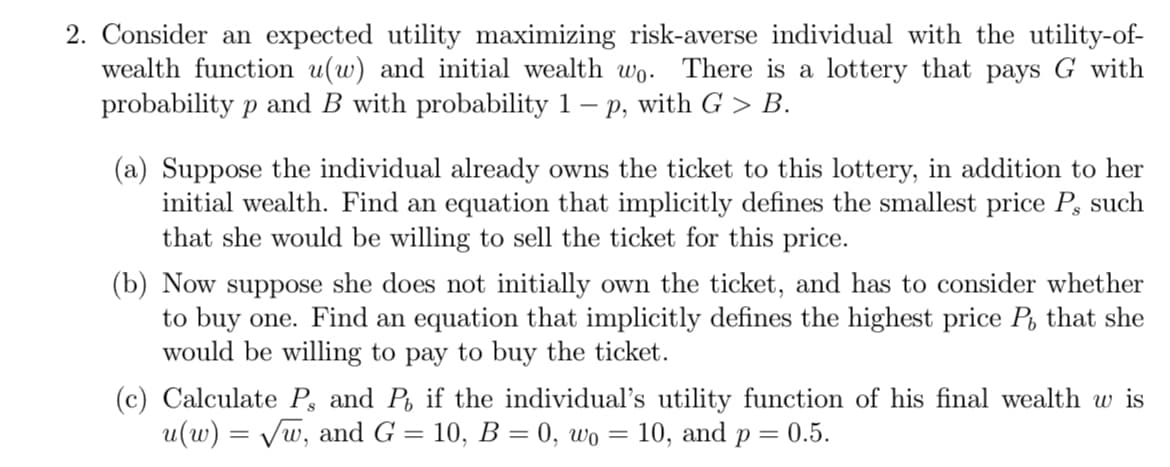2. Consider an expected utility maximizing risk-averse individual with the utility-of- wealth function u(w) and initial wealth wo. There is a lottery that pays G with probability p and B with probability 1 -P, with G> B. (a) Suppose the individual already owns the ticket to this lottery, in addition to her initial wealth. Find an equation that implicitly defines the smallest price P, such that she would be willing to sell the ticket for this price. (b) Now suppose she does not initially own the ticket, and has to consider whether to buy one. Find an equation that implicitly defines the highest price P, that she would be willing to pay to buy the ticket. (c) Calculate P, and P, if the individual's utility function of his final wealth w is u(w) = √w, and G = 10, B = 0, wo = 10, and p = 0.5.
2. Consider an expected utility maximizing risk-averse individual with the utility-of- wealth function u(w) and initial wealth wo. There is a lottery that pays G with probability p and B with probability 1 -P, with G> B. (a) Suppose the individual already owns the ticket to this lottery, in addition to her initial wealth. Find an equation that implicitly defines the smallest price P, such that she would be willing to sell the ticket for this price. (b) Now suppose she does not initially own the ticket, and has to consider whether to buy one. Find an equation that implicitly defines the highest price P, that she would be willing to pay to buy the ticket. (c) Calculate P, and P, if the individual's utility function of his final wealth w is u(w) = √w, and G = 10, B = 0, wo = 10, and p = 0.5.
Chapter7: Uncertainty
Section: Chapter Questions
Problem 7.5P
Related questions
Question
Explanation with answers plz

Transcribed Image Text:2. Consider an expected utility maximizing risk-averse individual with the utility-of-
wealth function u(w) and initial wealth wo. There is a lottery that pays G with
probability p and B with probability 1 – p, with G > B.
-
(a) Suppose the individual already owns the ticket to this lottery, in addition to her
initial wealth. Find an equation that implicitly defines the smallest price P, such
that she would be willing to sell the ticket for this price.
(b) Now suppose she does not initially own the ticket, and has to consider whether
to buy one. Find an equation that implicitly defines the highest price P, that she
would be willing to pay to buy the ticket.
(c) Calculate P, and P, if the individual's utility function of his final wealth w is
u(w) = √w, and G = 10, B = 0, wo = 10, and p = 0.5.
Expert Solution
This question has been solved!
Explore an expertly crafted, step-by-step solution for a thorough understanding of key concepts.
This is a popular solution!
Trending now
This is a popular solution!
Step by step
Solved in 3 steps with 7 images

Knowledge Booster
Learn more about
Need a deep-dive on the concept behind this application? Look no further. Learn more about this topic, economics and related others by exploring similar questions and additional content below.Recommended textbooks for you


Brief Principles of Macroeconomics (MindTap Cours…
Economics
ISBN:
9781337091985
Author:
N. Gregory Mankiw
Publisher:
Cengage Learning

Essentials of Economics (MindTap Course List)
Economics
ISBN:
9781337091992
Author:
N. Gregory Mankiw
Publisher:
Cengage Learning


Brief Principles of Macroeconomics (MindTap Cours…
Economics
ISBN:
9781337091985
Author:
N. Gregory Mankiw
Publisher:
Cengage Learning

Essentials of Economics (MindTap Course List)
Economics
ISBN:
9781337091992
Author:
N. Gregory Mankiw
Publisher:
Cengage Learning